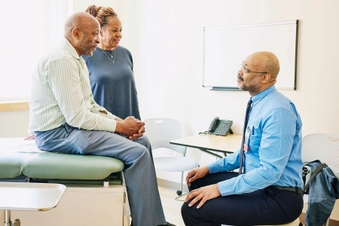Tips to Help Build Trust with Your DLBCL Care Team

Why Trust Matters With DLBCL Care
Think about having trust in your DLBCL care team as part of your treatment. Confidence in your doctors helps you maintain a more positive outlook with less anxiety. You’ll also be more motivated to follow your cancer treatment plan. Good communication is key to building trust. It doesn’t matter if your doctors have a good bedside manner. You can do a lot to create a positive working relationship with everyone on your oncology team.

Get Smart About DLBCL
Learn all you can about DLBCL so that you can ask the right questions in a clear way. Whether you’re going through your first treatment or getting care for relapsed or refractory lymphoma, understanding the specifics about your type of blood cancer also makes it easier to understand why your doctors are recommending the treatment they are.

Go for Mutual Understanding
You should both agree on your cancer care plan. That means you understand the course of your treatment and your doctors understand your goals and wishes. If you hear something that’s confusing, ask the doctor to repeat it and then repeat it back to them. You don’t want to leave any medical visit feeling that you missed an explanation or are in the dark about next steps. That erodes trust.

Ask How to Be a More Active Participant
Doctors are human, too, and they appreciate people who want to be more involved with their care. Your oncologist may be able to suggest trusted resources so you can learn more about your condition. He or she may offer tips for how you can better follow your cancer care plan or work more closely with other members of your team, like a dietitian who can show you how to eat for more energy or a pharmacist who can help you avoid drug side effects.

Go Over How You Like to Communicate
Do you prefer a phone call or telehealth visit for updates and test results or maybe an online method like a patient portal? Portals are a great way to ask questions and get answers in written form. If you’d like written documents about your care, ask for printouts. Some doctors offer booklets you can write in. If you want your practitioners to be able to talk directly to family members or friends, be sure to provide each one with needed consent forms.

Prepare for Each Visit
You should be able to ask as many questions as you need to. To make sure you know what you want to address, write each question down in advance, and leave space between them to put down the answers. In case time is limited, list them in order of importance and focus on the first ones. Before leaving, ask how you can get answers to concerns that weren’t addressed.

Speak Up About a Difference of Opinion
Disagreeing with or questioning your cancer doctor can feel intimidating. But you’re entitled to speak truthfully with your team if you have concerns, especially about your treatment plan. Trust is based on mutual respect. Just as you respect your doctor’s expertise, your doctor should respect you when you voice an issue. Keep your approach pleasant, and be thoughtful when you hear the answer.

Know Who Handles Coordination of Care
Your team may include a radiologist, dietitian, social worker, and physical and mental health therapists. The person who handles your coordination of care keeps them all informed so that no detail falls through the cracks. Often the oncologist who directs your treatment is the one who coordinates with the other members of your medical team, directly or through a nurse. Do build trust with each provider because you may need to reach out to them individually at times.

Advocate for Yourself
Cancer can cause a rollercoaster of emotions, but it’s important to stay strong so that you can be your own best advocate. That means speaking up for yourself, not being afraid to ask the same question at different points in your cancer journey, and asking questions until you feel that you have the full picture. Always take however much time you need before you make important decisions.

Bring a Loved One to Medical Visits
Cancer treatment can be complex. Even with written notes, it can be hard to keep all the information straight. A spouse, other family member, or close friend can be another pair of eyes and ears for you at appointments. He or she will be able to offer not only emotional support but also offer objective opinions to help you with decision-making.

Add a Patient Navigator to Your Team
A patient navigator is a professional whose job is to help you move through the health care system more easily. A navigator can improve your communications with your medical team and find solutions for practical matters, like scheduling appointments. He or she may go along with you to explain procedures or test results.

Consider a Second Opinion
Many people get a second opinion, especially when their cancer is challenging and there are different ways to treat it. Cancer doctors understand this, and some will encourage it. You may want to get a second expert’s viewpoint even when you trust your doctor. And you may even feel more confident in your first doctor if his or her treatment plan is what the second doctor also recommends.

Consider Changing Doctors
Sometimes, no matter how much you try to develop trust in the relationship, you might just feel that your oncologist (or other member of the team) isn’t a good match for you. Trust your instincts when something doesn’t feel right to you, and know that it’s possible to switch doctors. Ask your patient navigator or another member of your team who you do have confidence in to help with referrals.

Practice Good Self-Care
Taking care of yourself can make it easier to manage symptoms and be in a better position to work well with your medical team. Focus on getting in light exercise, a nutritious diet, and restful sleep. Also, take steps to avoid infections like frequent handwashing and recommended vaccines.

Acknowledge Your Emotions
When your emotions go haywire, you may not be able to see situations as clearly as you should, and that can interfere with your trust in your team. Talk through these feelings with a loved one, a doctor, or a therapist who can show you ways to boost your outlook. Journaling offers an outlet for expressing feelings, including positive ones. Also consider mindfulness to reduce stress. It emphasizes breathing and focusing on positive images and thoughts.
Show Sources
IMAGES PROVIDED BY:
- Maskot/Getty Images
- OJO Images/Getty Images
- E+/Getty Images
- DigitalVision/Getty Images
- DigitalVision/Getty Images
- Moment/Getty images
- DigitalVision/Getty Images
- Maskot/Getty Images
- Moment/Getty images
- DigitalVision/Getty Images
- Moment/Getty images
- iStock/Getty Images
- Moment/Getty images
- Moment/Getty images
- iStock/Getty Images
SOURCES:
National Cancer Institute: “Talking with Your Health Care Team,” “Communication in Cancer Care (PDQ®)–Patient Version,” “Healthcare Teams & Teamwork Processes in Cancer Care Delivery.”
Lymphoma Research Foundation: “Ask the Doctor: There are several therapies now approved for relapsed/refractory DLBCL. What is a good way to determine which are the best options for me?”
Cancer Nation: “Talking With Your Doctor.”
National Coalition for Cancer Survivorship: “Teamwork—The Cancer Patient’s Guide To Talking With Your Doctor.”
CancerCare: “Your Health Care Team: Understanding Their Roles,” “Healing With Words: Journaling and Reflecting Throughout Treatment.”
National Foundation for Cancer Research: “Building Your Care Team and Communicating with Doctors.”
Duke Health: “Duke Care Coordinators, Patient Navigators Help You Through Health Challenges.”
National Library of Medicine: “What are patient navigators and how can they improve integration of care?”
Cleveland Clinic: “Diffuse Large B-Cell Lymphoma.”
CDC: “Cancer Survivors: Staying Healthy During Cancer Treatment.”
American Cancer Society: “Practice Mindfulness and Relaxation.”